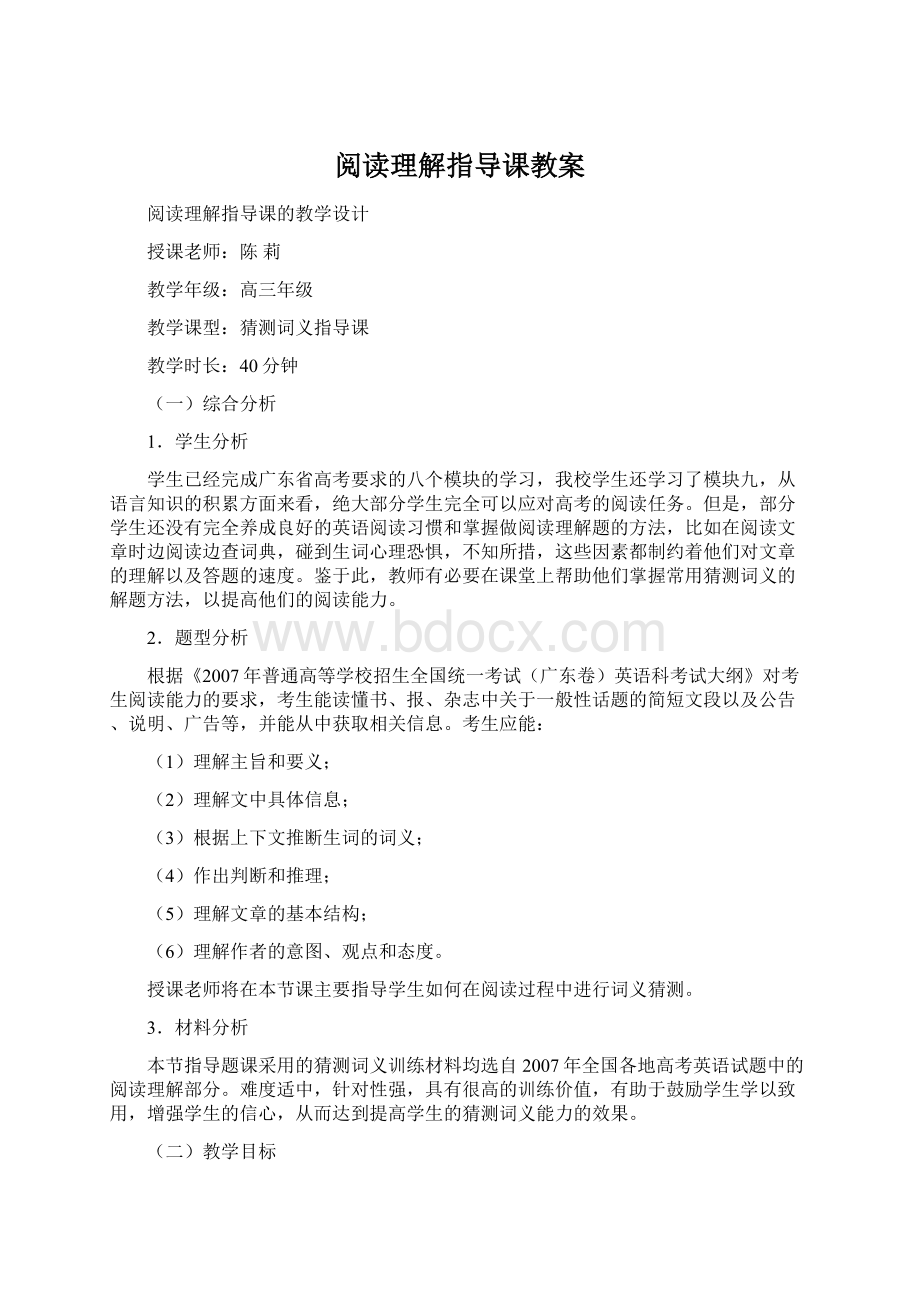阅读理解指导课教案.docx
《阅读理解指导课教案.docx》由会员分享,可在线阅读,更多相关《阅读理解指导课教案.docx(15页珍藏版)》请在冰豆网上搜索。

阅读理解指导课教案
阅读理解指导课的教学设计
授课老师:
陈莉
教学年级:
高三年级
教学课型:
猜测词义指导课
教学时长:
40分钟
(一)综合分析
1.学生分析
学生已经完成广东省高考要求的八个模块的学习,我校学生还学习了模块九,从语言知识的积累方面来看,绝大部分学生完全可以应对高考的阅读任务。
但是,部分学生还没有完全养成良好的英语阅读习惯和掌握做阅读理解题的方法,比如在阅读文章时边阅读边查词典,碰到生词心理恐惧,不知所措,这些因素都制约着他们对文章的理解以及答题的速度。
鉴于此,教师有必要在课堂上帮助他们掌握常用猜测词义的解题方法,以提高他们的阅读能力。
2.题型分析
根据《2007年普通高等学校招生全国统一考试(广东卷)英语科考试大纲》对考生阅读能力的要求,考生能读懂书、报、杂志中关于一般性话题的简短文段以及公告、说明、广告等,并能从中获取相关信息。
考生应能:
(1)理解主旨和要义;
(2)理解文中具体信息;
(3)根据上下文推断生词的词义;
(4)作出判断和推理;
(5)理解文章的基本结构;
(6)理解作者的意图、观点和态度。
授课老师将在本节课主要指导学生如何在阅读过程中进行词义猜测。
3.材料分析
本节指导题课采用的猜测词义训练材料均选自2007年全国各地高考英语试题中的阅读理解部分。
难度适中,针对性强,具有很高的训练价值,有助于鼓励学生学以致用,增强学生的信心,从而达到提高学生的猜测词义能力的效果。
(二)教学目标
1.情感态度目标
阅读理解是高考英语的重头戏,分值较重,此题做得好坏将直接影响高考的成败,因此,教师要培养学生遇难不惊、遇易不松的心态以及顽强的意志。
积极向上的情感、强烈的学习动机有利于学生提高学习效率;坚强的意志和较强的自信心有助于学生克服外语学习中遇到的困难。
消极的情感如焦虑、害怕、紧张、愤怒、沮丧、怀疑、厌恶等,会影响学习潜力的发挥。
如果学习者的消极情感影响太大,再好的教师、教材、教学方法也无济于事。
在阅读理解指导课中,教师要多鼓励学生,激发学生学习热情,将学生的注意力引导到解题技巧上来。
本节课旨在利用高考真题帮助学生快速感知技巧,提高其信心和求知欲。
2.学习策略目标
从平时训练可以看出,学生在做阅读理解题时存在一些问题,如根据上下文推断生词的词义、概括文章大意等。
因此,本节课的学习策略目标是:
(1)指导学生的解题思路;
(2)让学生在实际运用中掌握猜测词义的八种方法。
难点:
1.利用Similarity相似法猜测词义;
2.利用Context上下文语境猜测词义。
(三)教学过程
步骤
课堂实施
设计说明
课前准备
制作课件;筛选2007年高考全国各地英语试题中阅读理解中的猜测词义题目,并分为堂上训练用和课后作业两部分。
Step1.
Lead-in
引入主题
词义猜测题常用的提问方式有:
1)Theword“…”refersto/probablymeans/couldbestbereplacedby_______.
2)Theword“…”ismostlikelytomean______.
3)Whatdoyouthinktheexpression“…”standsfor?
4)Theunderlinedword“…”means______.
用这些问题引入本节主题,让学生对阅读理解题中的猜测词义题的提问方式有所了解,从而引发其对猜测题的解题方法的思考。
Step2.
Methods
列举方法
1.Definition定义法2.Contrast对比法
3.Similarity相似法4.Cause&Effect因果法
5.Example例举法
6.WordFormation构词法
7.Context上下文
8.CommonSense普通常识
先引导学生列举熟悉的方法,教师再作点评、归纳,并列出常用的解题方法,让学生了解,为下一步详细介绍作铺垫。
Step3.
Introduction
方法介绍
1.Definition定义法:
一般通过定义、定语(从句)或同位语(从句)来确定词义。
Eg:
Itwillbeveryhardbutverybrittle—thatis,itwillbreakeasily.
Theherdsman,wholooksaftersheep,earnsabout650yuanayear.
2.Contrast对比法:
利用文中的反义词以及表对比关系的词(组)猜测词义。
表示对比的词有but、while、however、otherwise等。
Eg:
Mostofusagreed,however,Billdissented.
Sheisusuallypromptforallherclass,buttodayshearrivedinthemiddleofherfirstclass.
3.Similarity相似法:
利用同义词、近义词或词组猜测词义。
Eg:
Cleaningupwaterwaysisanenormoustask.Thejobissolarge,infact,thatthegovernmentmaynotbeabletosavesomeoftheriversandlakeswhichhavebeenpolluted.
4.Cause&Effect因果法:
从原因推测结果,从结果推测原因。
Eg:
Onewhoisdestitutehasagreatneedforfoodandclothing.
Thatmuseumissoimmensethatitwillbeimpossibletoseealltheexhibitsinoneday.
5.Example例举法:
利用文中的举例猜测词义。
常见的举例的提示词有forinstance,forexample,suchas等。
Eg:
Todayyoungcouplesoftenspendlotsoftheirmoneyonappliances,forinstance,washingmachines,refrigeratorsandcolortelevisions.
6.WordFormation构词法:
英语单词大多是由词根、词头(前缀)和词尾(后缀)所组成。
词根是单词最基本的部分,表达单词的基本含义。
在词根前或后加上前缀或后缀,可以用来引申或转变原词的意义。
只要我们掌握了各种词根、词头和词尾的基本含义,那么就可以很容易猜测出由其构成的新词的含义了。
中学英语中常见的前缀和后缀有:
super-(超)mini-(极小的,微小的)
micro-(极微小的)re-(再,反复)
mis-(误,恶)im-(不)
un-(不,非)in-(不,非)
non-(不,非)-able(能…的)
-less(不,无)-wards(向)
Eg:
superman,nonnatural,homeless,rebuild,microwave,mispronounce,nonsmoker,eastwards
I’mgoingtobuyamicrobus.
7.Context上下文:
利用语境及前后的提示来猜测词义。
Eg:
HesoundedquitenervousandhehadbeentalkingforaminuteorsobeforeIunderstandanything.EventhenallIcouldmakeoutwasthatsomeonecalledMaryhadhadaverybadaccident.
Tomsawanowllastnightbutitflewawaywhenhegotnear.
Thechildrenarelookingatalarge,hairyapeatthezoo.
8.Commonsense普通常识:
根据普通常识和生活经验来猜测词义。
在阅读的过程中,如遇到生词,有时可以根据自身的直接或间接的经验,或运用自己已有的常识将其推测出来。
比如了解一些英美国家的天文地理、风俗习惯、宗教信仰、政治结构、社会制度等,可以帮助加深对文章的理解,遇到生词时,猜测词义的能力自然就会增强。
Eg:
Whenadoctorperformsanoperationonapatient,heusuallygivesananesthetictomakehimunconscious,becausehedoesnotwanthispatienttofeelpainortoknowwhatishappeningtohim.
向学生具体介绍常用的八种做猜测词义的解题方法,让他们熟悉这些方法,并且能够现学现用。
Step4.
Inquiry-basedactivities(I)
探究活动
(1)
Guessthecorrectmeaningsoftheunderlinedwords.
1.Therearesomeglaciersmovingdownthemountainvalleys.Aglacierisariverofice.
2.Heisaresoluteman.Oncehemadeuphismindtodosomething,hewon’tgiveituphalfway.
3.Mr.BrownisnowworkingatPrincetonUniversityfarawayfromhome.Forthisreasonhehastorentaroomneartheofficewhereheworks.
4.Theofficialaskedthemanwhathisoccupationwas.Themantoldhimthatheworkedasanengineer.
5.Theoldwomanhasastrangehabittokeepover100catsinherhouse.Herneighborallcallheraneccentriclady.
6.Inmanycountriestherearetwofinancialextremes,frompenurytogreatwealth.
7.Mrs.Smithisloquaciouswhileherhusbandisthesilenttype.
8.Thosenewcomerswerenotusedtothelifeinthesuburbswhichwassodifferentfromthatinsidethecity.
9.Thisboyisnotstupid,onthecontrary,noonecouldbemoreintelligent.
10.Childrenarealwaysboasting.Theysaythingslike“MyDad'scarisbiggerthanyourDad's,”“MyMomissmarterthanyours.”and“Myfamilyhasmoremoneythanyours.”
学生通过探究活动一(在句子中猜测词义),基本掌握所学的猜测词义题的解题方法。
Step5.
Inquiry-basedactivities(II)
探究活动
(2)
1.TensofthousandsofbabypenguinsfacestarvationaftertwogianticebergsbrokeofftheAntarcticicesheetandblockedtheirparents’roadtothefeedingareas.AdelineandemperorpenguinsnestingontheRossislandrookeriesarenowforcedtowalklongdistancesovertheicebergstoobtainfoodfortheirchicks,bornduringtheNovember-Decemberbreedingseason.
2.Aman’spositionamongtheblack-tentpeopledependsonhisancestors,relatives,andfellowtribesmen.Iftheyarehonored,heisalsohonored.Iftheyaredisgraced,hetooisdisgraced.Thereforeonecarefullyguardsthehonorofhisfamily,hislineage(宗系),andhistribe.
3.Therulerhadbeensocruelanddishonestthataftertherevolutionhewasbanished.AfewmembersoftheSenate(参议院)opposedthisdecision,butthemajorityvotedthattherulershouldleavethecountryforever.
4.Myfirstjobwastodrivetheoxenthatploughedthecanefields.Iwouldwalkbehindanox,guidinghimwithabroomstick.For$1aday,Iworkedeighthoursstraight,withnofoodbreaks.Itwasverytediouswork,butitpreparedmeforlifeandtaughtmemanylastinglessons.Becausetheplantationownerswerealwayswatchingus,IhadtobeontimeeverydayandworkashardasIcould.
5.Althoughheoftenhadthechance,Mr.Brownwasneverabletostealmoneyfromacustomer.Thiswouldendangeredhispositionatthebank,andhedidnotwanttojeopardizehisfuture.
6.Afterafour-yearrelationshipwithamajorfortune100companybeginningasasalestraineeandendingasaregionalsalesmanager,Ileftthecompanyattheheightofmycareer.ManypeoplewereastoundedthatIwouldleaveafterearningasix-figureincome.AndtheyaskedwhyIwouldriskeverythingforadream.
学生通过探究活动二(在文段中猜测词义),进一步巩固猜测词义题的解题方法,提高灵活运用的能力。
Step6.
Guidance
教师点评
同学们在做词义猜测题时注意不要脱离语境。
有些常用词在特定的上下文中,或专业性文章中,具有特殊的或专门的词义。
在解这类题时,必须仔细地研读划线部分的上下文,有时阅读的视线还要扩大一些。
如果离开特定的语言环境来理解生词意义,必然会理解错误。
教师通过归纳点评,提醒学生在做词义猜测题时,要分析语境,不要孤立思考,以便学生能够融会贯通,熟能生巧。
Step7.
Summary
归纳总结
1.Definition定义法
2.Contrast对比法
3.Similarity相似法
4.Cause&Effect因果法
5.Example例举法
6.WordFormation构词法
7.Context上下文
8.CommonSense普通常识
再现方法,加深印象。
Step8.
Homework
课后作业
运用今天所学的解题方法,完成印发的练习。
学以致用。
附:
Homework
Passageone:
Tensofthousandsofbabypenguinsfacestarvation(饥饿)aftertwogianticebergsbrokeofftheAntarcticicesheetandblockedtheirparents’roadtothefeedingareas.AdelineandemperorpenguinsnestingontheRossislandrookeriesarenowforcedtowalklongdistancesovertheicebergstoobtainfoodfortheirchicks,bornduringtheNovember-Decemberbreedingseason..
1.Whatdoestheunderlinedword“obtain”probablymean?
AeatBgetCsellDbuy
Passagetwo:
Aman’spositionamongtheblack-tentpeopledependsonhisancestors,relatives,andfellowtribesmen.Iftheyarehonored,heisalsohonored.Iftheyaredisgraced,hetooisdisgraced.Thereforeonecarefullyguardsthehonorofhisfamily,hislineage(宗系),andhistribe.
2.Theword“disgrace”means_________inthistext.
AhonorBendangerCproudDshame
Passagethree;
Therulerhadbeensocruelanddishonestthataftertherevolutionhewasbanished.AfewmembersoftheSenate(参议院)opposedthisdecision,butthemajorityvotedthattherulershouldleavethecountryforever.
3.Theunderlinedword“banished”mean__________.
AkilledbystoningBsentaway
CimprisonedDpunishedbywhipping
Passagefour:
Whatmakesonepersonmoreintelligentthananother?
Whatmakesonepersonagenius,likethebrilliantAlbertEinstein,andanotherpersonafool?
Arepeoplebornintelligentorstupid,orisintelligencetheresultofwhereandhowyoulive?
Theseareveryoldquestionandtheanswerstothemarestillnotclear.
Weknow,however,thatjustbeingbornwithagoodmindisnotenough.Insomeways,themindislikealegoranarmmuscle.Itneedsexercise.Mental(donewiththemind)exerciseisparticularlyimportantforyoungchildren.Manychildpsychologists(心理学家)thinkthatparentsshouldplaywiththeirchildrenmoreoftenandgivethemproblemstothinkabout.Thechildrenarethenmorelikelytogrowupbrightandintelligent.If,ontheotherhand,childrenareleftaloneagreatdealwithnothingtodo,theyaremorelikelytobecomedullandunintelligent.
Parentsshouldalsobecarefulwhattheysaytoyoungchildren.Accordingtosomepsychologists,ifparentsarealwaystellingachildthatheorsheisafooloranidiot,thenthechildismorelikelytokeepdoingsillyandfoolishthings.Soitisprobablybetterforparentstosayverypositive(helpful)thingstotheir